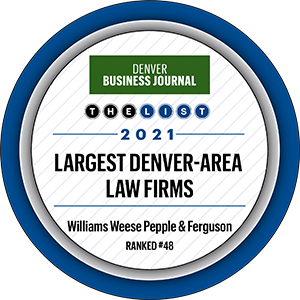On June 6, 2023, Governor Polis signed the Protecting Opportunities and Workers’ Rights (POWR) Act into law. The Act makes extensive changes to the Colorado Anti-Discrimination Act (CADA). These changes will have significant effects on employers in Colorado. The provisions of the POWR Act take effect on August 7, 2023, and apply to employment practices occurring on or after that date.
Changes to Standard for Workplace Harassment Claims
The first sweeping effect of the POWR Act is employees will have a lower burden of proof to establish a claim of harassment in the workplace. Prior to the POWR Act, to prove a claim of harassment, an employee needed to show that they were subject to harassment that was “severe or pervasive.” The POWR Act has significantly lowered this standard. Now, an employee need only show that they were subject to conduct that was “subjectively offensive to the individual alleging harassment and objectively offensive to a reasonable individual who is a member of the same protected class.”
In addition to lowering the standard of proof for harassment claims, the POWR Act created new rules which define when harassment has occurred in the workplace:
- The nature of an employer’s work is not relevant to whether an employee was subject to harassment. Additionally, the frequency with which past harassment occurred in an employer’s workplace is not relevant to whether an employee was subject to harassment.
- Petty slights, minor annoyances, and lack of good manners do not constitute harassment unless, when taken individually or in combination, the conduct meets the POWR Act’s new standard for harassment (see underlined standard above).
- Harassment is to be determined based on the totality of the circumstances, considering the following factors: the frequency of the conduct; the number of individuals engaged in the conduct; the type or nature of the conduct; the duration of the conduct; the location of the conduct; whether the conduct is threatening; whether there is a power-differential between the parties involved; whether humiliating or degrading conduct occurred, including the use of epithets or slurs; and whether the conduct reflects stereotypes about an individual’s protected class.
The POWR Act limits the ability of employers to assert an affirmative defense to claims of harassment by a supervisor. Employers can only assert an affirmative defense in situations where a supervisor is the alleged harasser when:
- The employer has a program that is reasonably designed to prevent harassment, deter future harassers, and protect employees from harassment. Pursuant to this program, the employer must: (1) take prompt, reasonable action to investigate or address alleged discriminatory or unfair employment practices; and (2) take prompt, reasonable remedial actions, when warranted, in response to complaints of discriminatory or unfair employment practices.
- The employer has communicated the existence and details of its program to both supervisory and non-supervisory employees; and
- The employee has unreasonably failed to take advantage of the program.
These changes to the harassment provisions of CADA are likely to cause an uptick in harassment litigation in Colorado, especially brought on by the new lower burden of proof.
Changes to Employee-Protected Categories
The POWR Act added “marital status” as a protected category to the existing list of protected categories under CADA. “Marital status” is defined as a relationship or spousal status of an individual, including, but not limited to, being single, cohabitating, engaged, widowed, married, in a civil union, or legally separated, or a relationship or a spousal status of an individual who has had or is in the process of having a marriage or civil union dissolved or declared invalid.
Changes to Non-Disclosure-Agreement Requirements
The POWR Act has added stringent requirements for certain non-disclosure provisions to be enforceable. Specifically, the POWR Act states that non-disclosure agreements that limit the ability of the employee or prospective employee to disclose any alleged discriminatory or unfair employment practice are void unless:
- The non-disclosure provision applies equally to both the employer and the employee;
- The non-disclosure provision expressly states that it does not restrain the employee from disclosing the underlying facts of any alleged discriminatory or unfair employment practice: (a) including disclosing the existence and terms of a settlement agreement to Employee’s immediate family members, religious advisor, medical or mental health provider, mental or behavioral health therapeutic support group, legal counsel, financial advisor, or tax preparer; (b) to any local, state, or federal government agency for any reason, including disclosing the existence and terms of a settlement agreement, without first notifying the Company; (c) in response to legal process, such as a subpoena to testify at a deposition or in a court, including disclosing the existence and terms of a settlement agreement, without first notifying the Company; and (d) for all other purposes as required by law.
- The non-disclosure provision expressly states that disclosure of the underlying facts of any alleged discriminatory or unfair employment practice does not constitute disparagement if the disclosure is made under the parameters above.
- A non-disparagement provision must include a condition that if the employer disparages the employee to a third party, the employer may not seek to enforce either the non-disparagement or non-disclosure provisions of the agreement, nor seek damages against the employee;
- Any liquidated damages provision does not constitute a penalty or punishment and must provide for a reasonable, proportional, and non-punitive amount of damages; and
- The agreement contains an addendum, signed by all parties to the agreement, attesting to compliance with the POWR Act.
Notably, if an employer includes a non-disclosure provision that does not comply with the above, the employer is liable for a penalty of $5,000, plus actual damages, reasonable costs, and attorney’s fees in any private action.
Changes to Employer Recordkeeping Obligations
The POWR Act imposes additional recordkeeping obligations on employers. Specifically, an employer must maintain any personnel or employment record that the employer made or received for at least five years following: (1) the date the record was made or received; or (2) the date of final disposition of a charge of discrimination. Additionally, employers must maintain a designated file containing all written or oral complaints of discriminatory or unfair employment practices at their workplace. The complaints contained within the file must include the following information: (1) the date of the complaint; (2) the identity of the complaining party, if the complaint was not anonymous; (3) the identity of the alleged perpetrator; and (4) the substance of the complaint.
If you would like assistance advising human resource and management teams or updating policies and procedures in response to POWR, please reach out to our Labor and Employment team.





